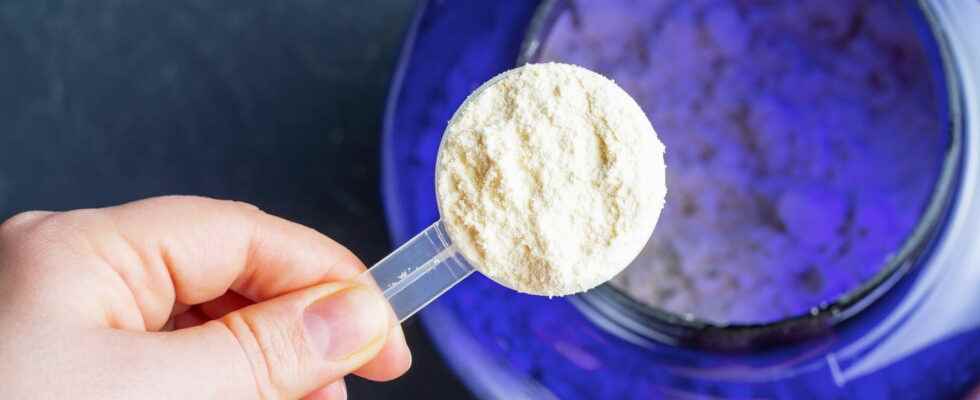Creatine is a very interesting organic component for improving physical performance in certain sports activities.
What is creatine?
Creatine is a organic component, derived from three amino acids (arginine, glycine and methionine). She is naturally produced by the body : synthesized by the kidneys, liver and pancreas, and stored in muscle fibres. She comes from food and can also be supplemented.
What does creatine do in the body?
Stored in the muscles, creatine is used to produceenergy. Its role is to transform a molecule, adenosine phosphate, into adenosine triphosphate or ATP, which is an energy molecule. “Creatine will thus have a impact on anaerobic efforts, very short efforts, like for sprinting. At the start of the race, the energy supplied to the muscle will come from creatine and oxygen will then intervene 30 to 40 seconds later“, explains Pierre Thomas, sports dietitian in Saint-Maur. Creatine therefore goes increase energy availability in the process of muscle contraction on short and intense efforts. To this increase in energy is added a feeling of increased strength : sports training is thus more intense, the breakdown of muscle fibers improved, better recovery and easier muscle mass gain.
Why is creatine good for bodybuilding?
“Creatine is interesting and very useful when you want gain muscle mass“, emphasizes Pierre Thomas. Creatine supplementation thus makes it possible to gradually increase strength and muscle volume, and thus improve athletic performance, strength or gain muscle.
When to take creatine?
Taking creatine in the form of dietary supplement will make it possible to increase the stocks in the muscles until saturation. “Creatine, present in the form powder, is available in different forms: tablets, capsules or powder. There is a label, the label Creapure®, which will allow you to have a quality creatine monohydrate“, notes Pierre Thomas. Creatine supplementation is interesting for activities that require efforts of short duration and maximum intensity, such as strength sports or disciplines that require power and explosiveness.
What is the dosage of creatine?
the daily dosage recommended for taking creatine is between 3-5 g/d. Its consumption must be carried out on the long term and not in the form of cures : “There is no specific timing for taking creatine, the idea is to integrate it into your daily diet to benefit from its advantages. It is a supplement that needs time to show its full effectiveness“. In practice, some athletes consume it after exercise, with others proteins as part of intensive sports training.
Is there a danger in taking creatine?
There is no danger in taking creatine continuously, although it is advisable to interrupt it in case of stopping the sport for a long time or in case of injury. It is necessary to follow the indicated dosage and do not hesitate to take the advice of a doctor.
What are the contraindications of creatine?
In case of chronic pathologies (diabetes, kidney damage, etc.), it is recommended not to take food supplements such as creatine without medical advice. “It must be understood that creatine will generate a little more waste, since it is part of the protein family, and that in this case the kidneys will be solicited for elimination. It is therefore not recommended to take this type of dietary supplement in the event of dysfunction of one or more organs“insists Pierre Thomas.
Thanks to Pierre Thomas, sports dietician in Saint-Maur.
